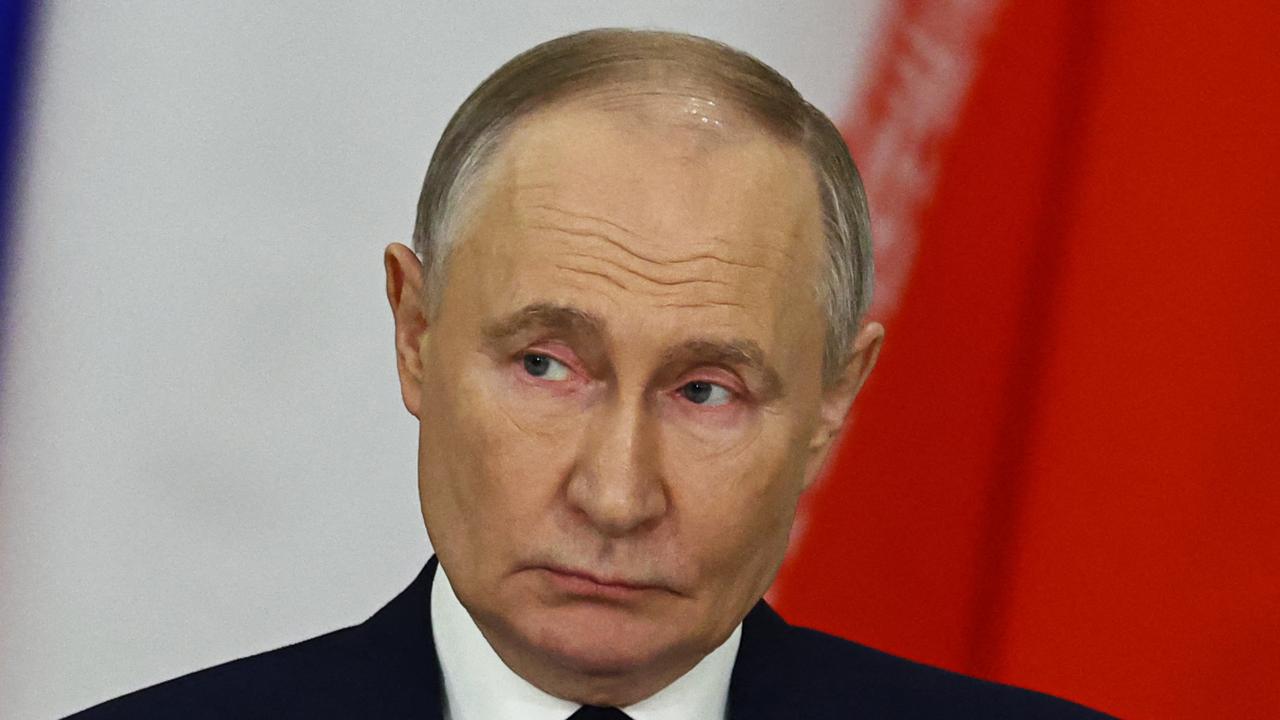China delivers anti-air missiles to Serbia in ‘unprecedented operation’
China has made a secretive delivery to a key ally of Russia in an “unprecedented operation” that the West fears could fuel further global instability.
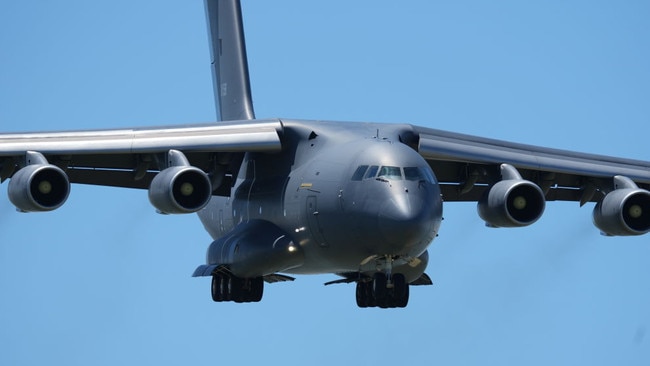
Innovation
Don't miss out on the headlines from Innovation. Followed categories will be added to My News.
China delivered a sophisticated anti-aircraft missile system to Russian ally Serbia over the weekend in a major operation demonstrating its military’s heavy lift capability and raising Western fears of an arms build-up in the troubled Balkans region.
Six Chinese Air Force Y-20 transport planes landed at Belgrade’s Nikola Tesla airport early on Saturday, according to media and aviation experts who tracked the flights, with reports later emerging that they were carrying HQ-22 surface-to-air missile systems for the Serbian military.
The flights, spaced about 100 kilometres apart, were first spotted by open-source aircraft trackers just north of Istanbul, Turkey, according to military outlet The War Zone.
Y-20A number six.
— Evergreen Intel (@vcdgf555) April 9, 2022
Recap:
The following six PLAAF 🇨🇳 Y-20As have been seen heading for Serbia:
20041 #7A4281
20042 #7A4282
20045 #7A4285
20047 #7A427F
20049 #7A4287
20142 #7A428Apic.twitter.com/RCqBjlSz8U
People's Liberation Army AF transport plane Xi'an Y-20-A Pà ng niū 20041 is flying high over Bosphorus en route from Batajnica AFB likely to Ürümqi after delivering Guizhou Aerospace Industry / Shaanxi Yellow River Group manufactured HQ22 Red Banner SAM system's export version FK3 pic.twitter.com/s83U8V7QVK
— Yörük Işık (@YorukIsik) April 9, 2022
Interesting find by @Prova_61 👠... In fact I have never seen before this, what appears to be the hatch removed for the chaff & flare dispenser boxes.
— @Rupprecht_A (@RupprechtDeino) April 9, 2022
(Images via @é“马军戈战沙场 from Weibo) pic.twitter.com/3xBOrkMlmI
Nikola Tesla Airport 🇷🇸🇨🇳 pic.twitter.com/wVMoZCdECR
— ZOKA (@200_zoka) April 9, 2022
The publication noted that the appearance of the Y-20s – roughly comparable to the US Air Force’s C-17 Globemaster III – “raised eyebrows because they flew en masse as opposed to a series of single-aircraft flights”.
“The Y-20’s presence in Europe in any numbers is also still a fairly new development,” it added.
“It’s quite probable that the PLAAF used this delivery as a sort of demonstration of its own airlift capability given NATO’s ongoing efforts to ferry supplies and matériel to Ukraine’s war effort.”
Plane watchers later observed the cargo jets with Chinese markings at Belgrade’s civilian airport.
“Observers noted at least some of the planes had the covers for their chaff and flare countermeasures systems removed,” The War Zone wrote.
“It looks very much like they may have been equipped with live countermeasures, which would be anticipatory of some sort of potential threat. What that threat would have been isn’t clear.”
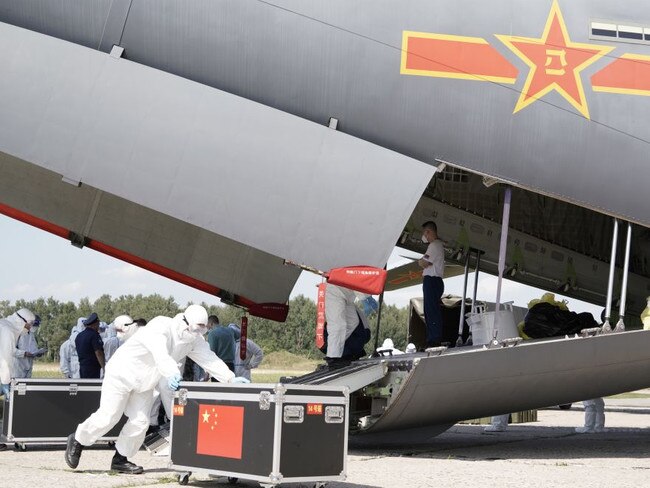
Serbian President Aleksandar Vucic all but confirmed the weapons delivery, saying on Saturday he would present “the newest pride” of the Serbian military on Tuesday or Wednesday, the Associated Press reported.
Mr Vucic had previously complained that NATO members were refusing to allow the system’s delivery flights over their countries amid tensions over Russia’s invasion of Ukraine.
China made the delivery over the territory of at least two NATO member states, Turkey and Bulgaria.
Serbia’s purchase of the Chinese-made HQ-22 — instead of the Russian S-300 or S-400 — was first revealed in 2020.
Earlier that year, Serbia became the first European country to deploy Chinese unmanned aerial vehicles with the acquisition of six CH-92A combat drones armed with laser-guided missiles, the Eurasian Times reported, sparking concerns about the growing co-operation between the two countries.
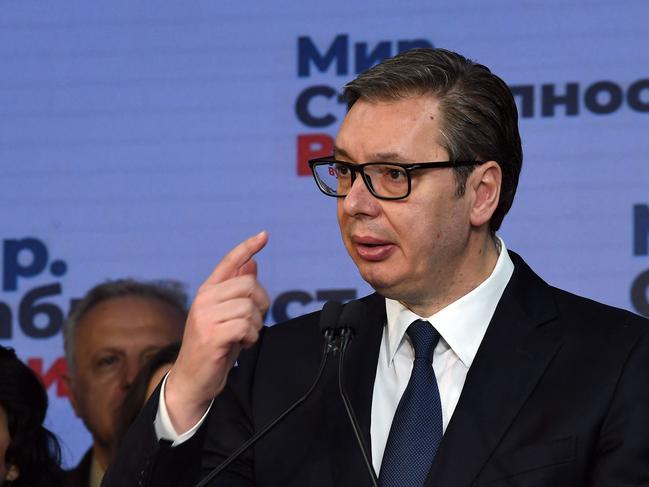
At the time, the United States warned Serbia that such deals with Beijing could jeopardise its potential for European Union membership.
“Procuring military and defence equipment is a sovereign decision,” the US Embassy in Belgrade said in a statement.
“However, governments should understand the short- and long-term risks and costs involved in doing business with Chinese companies. Procurement choices should reflect Serbia’s stated policy goal of greater European integration. Alternative vendors which are not beholden to authoritarian regimes offer equipment that is both capable of meeting Serbia’s defence need and comparable in quality and cost.”
Mr Vucic hit back that “whenever we decide to buy something, somebody has something against it”.
“We will make the decision as a free and sovereign country,” he said.
Dr Samuel Ramani, geopolitical analyst and Associate Fellow at the Royal United Services Institute, said the HQ-22 deliveries had “prompted fears of a military build-up in the western Balkans, which could augment instability triggered by the Ukraine war”.
“Russia’s rhetoric towards Bosnia has been especially threatening in recent weeks,” he wrote.
Milorad Dodik, the Moscow-backed, hard-line Bosnian Serb leader, has long advocated for secession and for the Serb mini-state to join neighbouring Serbia.
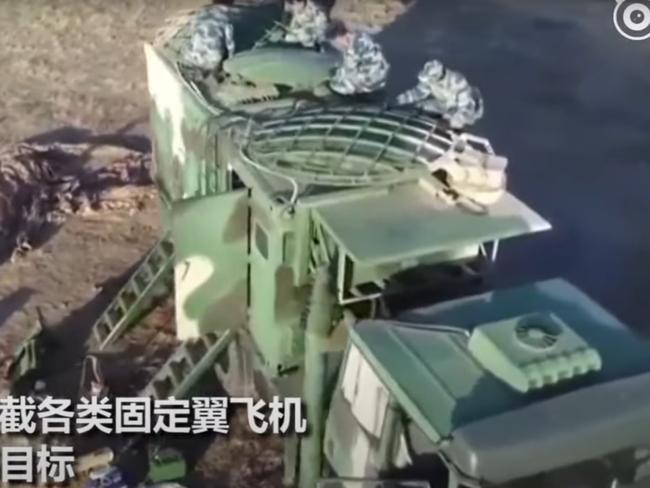
And tensions have been rising between Serbia and neighbouring Kosovo, its former breakaway region that proclaimed independence in 2008 — with the latest deliveries sparking fears of another war after the bloody conflicts of the 1990s.
Neither Serbia nor its allies Russia and China officially recognise Kosovo’s independence, but most Western countries including the United States do.
“Serbia’s interest in China’s HQ-22 missiles is longstanding,” Dr Ramani wrote.
“But the timing is interesting. China and Serbia’s foreign ministers hailed their ‘true friendship’ yesterday. China defended Serbia over its Western pressure claims on the UN Human Rights Council vote against Russia.”
Serbia has voted in favour of UN resolutions condemning Russia’s actions, but has refused to join international sanctions.
Last week, Russian President Vladimir Putin congratulated Mr Vucic on his landslide re-election victory and said he hoped to build on their “strategic partnership”, the Kremlin said.
“I expect that your work as head of state will continue to contribute to the strengthening of the strategic partnership that exists between our countries,” Mr Putin said in his telegram to Mr Vucic, according to the Kremlin statement.
“This undoubtedly meets the interests of the fraternal peoples of Russia and Serbia.”
The Kremlin praised the Serbian leader’s “convincing” victory, adding that Mr Putin hailed his “independent” foreign policies.
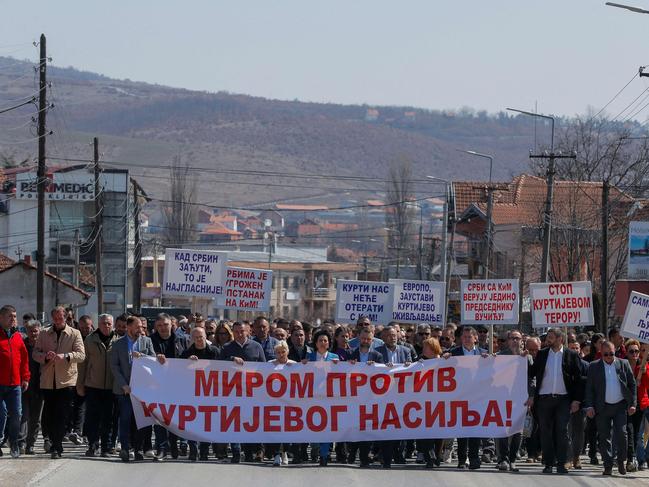
From the Chinese point of view, Dr Ramani noted that the “transfer of weapons is being discussed much more in the Chinese media than the significance of arming Serbia”.
China’s state-run Global Times confirmed the mission on Sunday, hailing the movement of the cargo planes as displaying the military’s “strategic transport capabilities”.
“China has not made an official announcement about the mission as of press time, but the Global Times learned that the Y-20s indeed have carried out such a flight,” the outlet wrote.
The Global Times said six Y-20s would “mark an unprecedented overseas operation”.
“It is a new record that an overseas mission features six Y-20s, and it is also very rare to see so many Y-20s being deployed at the same time, Fu Qianshao, a Chinese military aviation expert, told the Global Times on Sunday,” the outlet wrote.
“The mission reflects a significant improvement in the PLA Air Force’s long-range strategic transport capabilities, as well as the large transport aircraft’s logistics support and maintenance capabilities in intercontinental flights, Fu said.”
Chinese military expert and TV commentator Song Zhongping told the Global Times that unlike just flying to Russia, the Y-20s had to travel through several other countries to reach Serbia, “so China must have had much co-ordination and communication with these countries and gained their authorisation in order to realise the flight”.
— with AFP
Originally published as China delivers anti-air missiles to Serbia in ‘unprecedented operation’





